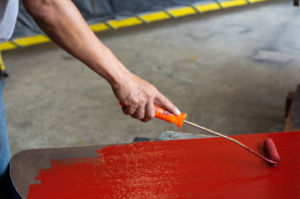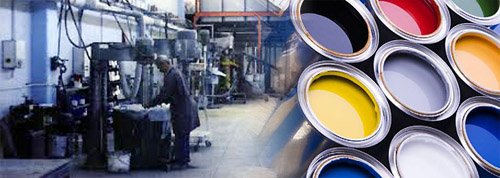Introduction to Friendly Industrial Coatings
Industrial coatings play a pivotal role in various sectors by serving multiple functions, extending the lifespan of products, and enhancing their visual appeal. They are defined as protective layers applied to surfaces to shield them from environmental factors, corrosion, and wear. These coatings can be categorized into different types, including but not limited to, paints, varnishes, and sealants, each designed for specific applications and benefits.
The primary purpose of industrial coatings is to protect substrates, which can range from metals and plastics to wood and concrete. By applying these layers, industries can prevent degradation caused by factors such as moisture, chemicals, UV radiation, and abrasion. In addition to protective functions, coatings also contribute to aesthetic enhancements, offering a variety of colors and finishes that can improve the overall appearance of products.
Industrial coatings find applications across diverse sectors, including automotive, aerospace, construction, and manufacturing. For instance, in the automotive industry, protective coatings safeguard vehicles from the damaging effects of weather and road conditions, ensuring longevity and durability. In the manufacturing domain, various products undergo coating processes to enhance performance and safeguard against operational risks.
Recently, there has been a significant shift towards environmentally friendly industrial coatings. As industries become more aware of environmental concerns, the demand for sustainable solutions has surged. Traditional coatings often contain volatile organic compounds (VOCs) that can harm the environment and human health. In contrast, eco-friendly coatings are formulated with low or zero VOCs, showcasing a commitment to sustainability while still providing the necessary protective characteristics.
By embracing environmentally friendly industrial coatings, businesses not only meet regulatory compliance but also enhance their brand reputation and reduce their ecological footprint. This transition is essential as we strive for sustainable development in industrial practices.
The Importance of Environmental Sustainability
As the global landscape continues to evolve, the coatings industry faces a multitude of environmental challenges. Traditional industrial coatings often contain volatile organic compounds (VOCs) and hazardous materials that can significantly impact both human health and the environment. The emissions from these coatings contribute to air pollution, leading to smog formation and various health issues, including respiratory problems and skin irritation. The detrimental effects are not limited to air quality; they also extend to water and soil contamination through improper disposal practices.
The ongoing industrial activities worldwide have resulted in increased demands for coatings that are not only effective but also safe for both users and the environment. This urgent scenario underscores the necessity for adopting sustainable practices within the coatings industry. Environmental sustainability should be regarded as a paramount consideration when developing new products and processes. There is a pressing need for coatings manufacturers to evaluate the lifecycle of their products and the subsequent impact on natural ecosystems.
Transitioning to environmentally friendly coatings can mitigate the adverse effects traditionally associated with their predecessors. These modern alternatives often utilize natural resources and renewable materials, effectively reducing the carbon footprint associated with manufacturing and application processes. Moreover, they frequently contain less harmful substances, thereby minimizing health risks for workers and end-users.
The shift towards sustainable materials is imperative not just for regulatory compliance but also for enhancing brand reputation and meeting consumer demands. As awareness of environmental issues grows, consumers are increasingly favoring companies that demonstrate a commitment to sustainability. Thus, it is crucial for businesses within the coatings industry to embrace eco-friendly solutions, ensuring their practices align with the broader objective of preserving our planet.

Mithila Paints: A Commitment to Sustainability
Mithila Paints stands at the forefront of innovation in the industrial coatings sector, emphasizing a robust commitment to sustainability. As a pioneer in this field, the company’s mission revolves around producing environmentally friendly industrial coatings without compromising quality or performance. Their core values center on not only addressing the needs of their customers but also being conscientious stewards of the environment.
Central to Mithila Paints’ philosophy is the belief that industrial coatings can contribute to both operational efficiency and ecological preservation. The company utilizes cutting-edge technologies and sustainable materials to develop products that significantly reduce environmental impact. For instance, their formulations contain lower levels of volatile organic compounds (VOCs), which minimizes harmful emissions during application and extends the lifespan of the coatings used.
Mithila Paints also prioritizes research and development, continually exploring new methods to enhance the sustainability of their offerings. By investing in innovative practices and eco-friendly raw materials, the company aims to lead the way for others in the industry. This proactive approach is coupled with a transparent supply chain, ensuring that all processes—from sourcing to production—meet high environmental standards.
Furthermore, Mithila Paints actively engages with its customers to promote sustainable practices. Through educational initiatives, the company raises awareness about the benefits of environmentally friendly industrial coatings. Clients are encouraged to consider the lifecycle impacts of their choices, fostering a culture of sustainability in the industrial sector.
Ultimately, Mithila Paints embodies a vision in which industrial coatings contribute positively to both business success and environmental health. By remaining dedicated to sustainability, the company seeks to influence the industry collectively, paving the way for a greener future.
Types of Environmentally Friendly Coatings Offered by Mithila Paints
Mithila Paints offers a diverse array of environmentally friendly industrial coatings designed to meet the demands of various sectors while minimizing environmental impact. Among the key categories are water-based coatings, powder coatings, and bio-based coatings, each with unique characteristics suitable for specific applications.
Water-based coatings stand out for their low volatile organic compound (VOC) content, making them significantly less harmful to both health and the environment compared to traditional solvent-based options. These coatings offer excellent adhesion and durability, making them ideal for use in the automotive, furniture, and construction industries. Their quick-drying properties also enhance productivity, making them a preferred choice for manufacturers who value efficiency alongside sustainability.
Powder coatings are another environmentally friendly alternative that Mithila Paints provides. These coatings are applied as a dry powder and cured under heat to create a hard, protective finish. One of the main advantages of powder coatings is their minimal environmental impact, as they contain no solvents and result in little to no waste during application. They are perfect for metal products, such as appliances, fixtures, and automotive components, renowned for their exceptional durability and resistance to scratches, chemicals, and corrosion.
Lastly, bio-based coatings are an innovative solution gaining traction in the market. Utilizing renewable resources, these coatings help reduce reliance on fossil fuels and contribute to a lower carbon footprint. They offer versatility in application across different substrates, including wood, metal, and plastics. Industries such as furniture manufacturing and consumer goods are increasingly adopting bio-based coatings due to their sustainable profile and performance reliability.
In summary, Mithila Paints’ offerings of water-based, powder, and bio-based coatings exemplify a commitment to sustainability without compromising on quality or performance, empowering a broad spectrum of industries to adopt environmentally responsible practices.

Benefits of Using Eco-Friendly Industrial Coatings
In recent years, the adoption of environmentally friendly industrial coatings has gained significant momentum. These eco-friendly coatings are formulated with materials that are less harmful to the environment, providing numerous benefits that enhance sustainability while meeting industry standards. One of the primary advantages is the improvement of health and safety conditions for workers. Traditional coatings often contain volatile organic compounds (VOCs), which can emit harmful fumes. In contrast, eco-friendly coatings typically have lower or zero VOC levels, reducing exposure and contributing to a healthier workplace atmosphere.
Moreover, by utilizing environmentally friendly industrial coatings, businesses can significantly reduce their overall environmental footprint. These coatings are designed to minimize pollution during application and throughout their lifecycle. By selecting products that meet stringent environmental regulations, companies can demonstrate a commitment to sustainability. This compliance not only helps in preserving the environment but also ensures that organizations avoid potential fines and penalties associated with the use of hazardous materials.
Another notable benefit is the potential for cost savings over time. While the initial investment in eco-friendly industrial coatings may be higher than conventional options, the long-term savings can be substantial. Eco-friendly coatings often have superior durability and longer lifespans, which results in less frequent need for repainting or maintenance. Additionally, their reduced environmental impact can lead to lower waste disposal costs and benefits from green certifications, which can enhance a company’s marketability.
In summary, the advantages of eco-friendly industrial coatings extend beyond mere environmental benefits. They foster health and safety improvements, compliance with regulatory standards, and long-term cost-effectiveness. As industries increasingly prioritize sustainability, the transition to environmentally friendly coatings is not just beneficial—it is becoming essential for future growth and responsibility.
Case Studies: Successful Applications of Mithila Paints Coatings
Mithila Paints has made significant strides in the application of its environmentally friendly industrial coatings across various sectors. These case studies serve as illustrations of how industries have successfully integrated coated solutions, benefiting not only their operations but also contributing to broader sustainability goals.
One prime example can be found in the automotive industry, where a leading manufacturer adopted Mithila Paints’ eco-friendly coatings in their production lines. The transition to these coatings resulted in a remarkable 30% reduction in volatile organic compounds (VOCs) emissions. This reduction has not only improved the company’s compliance with environmental regulations but has also enhanced the indoor air quality for employees. The use of these innovative coatings has thus played a role in creating a safer, healthier work environment while aligning with the company’s commitment to sustainable practices.
In the construction sector, a prominent firm specializing in commercial buildings utilized Mithila Paints’ coatings for both aesthetic and protective purposes. By employing these environmentally friendly coatings, the firm was able to reduce maintenance costs by 25% due to the superior durability and longevity of the coatings. Furthermore, the application of eco-friendly coatings has developed a reputation among clients who prioritize sustainability in their projects, allowing the company to secure more contracts as a result.
Additionally, a municipal corporation in charge of public infrastructure applied Mithila’s coatings for its bridge maintenance programs. The implementation of these environmentally conscious coatings not only extended the lifespan of the structures but also contributed to a significant decrease in harmful runoff during rains. This clearly reflects how the choice of sustainable coatings can lead to both operational benefits and positive environmental impacts.
These case studies collectively illustrate how Mithila Paints’ eco-friendly coatings have successfully transformed operations in diverse industries, supporting their sustainability ambitions and reinforcing the broader trend toward environmentally responsible practices in manufacturing and construction.

Challenges in the Transition to Eco-Friendly Coatings
The transition to environmentally friendly industrial coatings presents a unique set of challenges for companies in various sectors. One of the primary concerns is the cost associated with adopting these eco-friendly solutions. Many traditional coatings are deeply entrenched in the manufacturing processes, and switching to alternatives may require a significant investment in new materials, equipment, or training. This financial burden can be difficult for small to medium-sized enterprises (SMEs) to absorb, especially when weighed against the immediate economic benefits of conventional solutions.
In addition to cost considerations, performance comparisons pose another significant hurdle. Eco-friendly coatings often need to meet the same durability and performance standards as their traditional counterparts. Many companies are hesitant to make the shift if they believe that the environmentally friendly options might not provide equivalent protection or longevity. There may be misconceptions about the capabilities of these coatings, as they may be perceived as inferior due to their natural composition. Rigorous testing and validation are essential to demonstrate that these sustainable coatings can perform just as well, if not better, than conventional products.
Changing consumer preferences also play a critical role in this transition. As public awareness of environmental issues continues to grow, consumers are increasingly demanding products that are sustainable and free from harmful chemicals. Companies must navigate these shifting preferences carefully, as they have to align their offerings with the values of an eco-conscious customer base without alienating those who prioritize cost or other attributes. Striking a balance between sustainability and performance while meeting customer expectations presents a complex challenge for manufacturers aiming to adopt eco-friendly industrial coatings.
Future Trends in Environmentally Friendly Coatings
The industrial coatings market is undergoing a significant transformation driven by sustainability, which has become a crucial consideration for manufacturers. One of the foremost trends in environmentally friendly coatings involves the adoption of innovative materials that minimize environmental impact while maintaining performance. Bio-based materials have gained substantial attention, with many companies investing in research to develop coatings derived from renewable resources. These bio-based options can significantly reduce reliance on traditional petroleum-based products, leading to a decrease in carbon footprints and promoting sustainable manufacturing practices.
Another emerging trend is the advancement in technology that allows for the development of high-performance, low-VOC (volatile organic compounds) coatings. These coatings not only comply with strict environmental regulations but also offer improved durability and aesthetic quality. Manufacturers are increasingly focused on formulating products that are easier to apply and require fewer resources for maintenance, thus contributing to overall sustainability. The drive for innovation in low-VOC formulations reflects the ongoing efforts to address health and environmental concerns associated with conventional coatings.
Additionally, the circular economy concept has started to influence the coatings industry significantly. Companies are exploring ways to design coatings that are easily recyclable or can be repurposed at the end of their life cycle. This commitment to innovation aligns with global efforts to combat waste and promote resource efficiency. By incorporating life cycle assessments in the development of new coatings, businesses are ensuring that their products have minimal environmental impact from production to disposal.
As regulatory pressures increase and consumer preferences shift towards more sustainable alternatives, it is likely that the trend toward environmentally friendly coatings will continue to expand. Continuous advancements in technology, materials, and recycling processes are poised to reshape the future landscape of industrial coatings, reinforcing the importance of ecological responsibility in the industry.

Conclusion: Building a Sustainable Future with Mithila Paints
In light of the pressing challenges faced by industries today regarding environmental sustainability, the role of environmentally friendly industrial coatings has become increasingly significant. Mithila Paints stands at the forefront of this movement, offering innovative solutions that not only meet the demands of contemporary manufacturing but also adhere to eco-friendly practices. By adopting such coatings, businesses can significantly reduce their environmental footprint while maintaining high performance and durability.
The transition towards sustainable coatings can yield numerous benefits for industries, including reduced emissions of volatile organic compounds (VOCs), improved worker safety, and the enhancement of overall product life. Moreover, the durability and lasting performance of environmentally friendly industrial coatings mean that industries can invest in quality solutions that minimize the need for frequent re-coating, further contributing to sustainability efforts. In this context, it’s essential to recognize the vital role that environmentally friendly coatings play in promoting a healthier planet while also driving competitive advantage for businesses.
As industries face increasing scrutiny regarding their environmental impact, the adoption of sustainable practices is not merely a choice, but an imperative. Mithila Paints provides a clear pathway for industries to embrace eco-conscious innovations and lead the way toward a greener future. Companies are encouraged to integrate these environmentally friendly solutions into their operations, as this commitment will contribute to a more sustainable economy. Ultimately, by choosing Mithila Paints, businesses are not just choosing a product; they are investing in a vision that prioritizes ecological responsibility and harmonizes industrial growth with environmental stewardship.
In conclusion, as the industry evolves, the significance of embracing sustainable practices cannot be overstated. The shift towards environmentally friendly industrial coatings is a crucial step in ensuring that we build a sustainable future for generations to come. It is time for businesses to take action, consider the ecological aspects of their operations, and partner with Mithila Paints to lead the charge toward a more sustainable industrial landscape.


